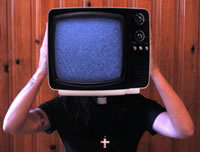 To say that Christian television is "not my thing" doesn't even get close. Christian music, Christian bookstores, Christian television, pretty much any aspect of what some call "the Christian-Industrial Complex" is "not my thing." Meanwhile, I have a blog called Sarcastic Lutheran, I am married to a Lutheran pastor, involved in the start of a new postmodern, urban Christian community and, God willing, will soon be ordained to the office of Word and Sacrament ministry in the Lutheran Church, all of which is to say, I'm pretty Christian.
To say that Christian television is "not my thing" doesn't even get close. Christian music, Christian bookstores, Christian television, pretty much any aspect of what some call "the Christian-Industrial Complex" is "not my thing." Meanwhile, I have a blog called Sarcastic Lutheran, I am married to a Lutheran pastor, involved in the start of a new postmodern, urban Christian community and, God willing, will soon be ordained to the office of Word and Sacrament ministry in the Lutheran Church, all of which is to say, I'm pretty Christian.
I'm not alone. Simply stated, there are two Christianities in America. (There are countless more Christianities in America that do not fit into the following categories, but humor me.) Group A are Christian and typically still are part of the dominant culture. They read books from the New York Times bestseller list, watch The Simpsons, and listen to pop music. These folks are more likely to belong to the moderate to progressive "mainline" denominations. Group B are also Christian, and they read books and watch TV, but they read "Christian" books and watch "Christian" TV and listen to "Christian" pop; these folks are more likely to be found in the conservative evangelical, Pentecostal, or fundamentalist sector of the church. So what happens when you take someone from Group A and expose her to 24 hours of Group B in the form of an entire day and night of Trinity Broadcasting Network? That is the question Seabury Press asked me in the summer of 2007.
Honestly, my first reaction to the pitch from Seabury to watch 24 consecutive hours of TBN was "doesn't the Geneva convention address that somewhere, like right after waterboarding?" But soon the idea grew on me, and I began to think of it like theological Fear Factor, or religious Super Size Me, which made it sound kind of fun. So my ?rst question was, naturally, "Can I invite my friends?"
A whole slew of other questions soon followed. Previous to the writing of this book, the whole of my exposure to TBN was limited to hotel room channel-sur?ng accompanied by an exclamation like "What in the world?" What little I knew about the world of Christian television I, to be honest, felt superior to. I also knew that while my ?rst reaction to, well, almost everything, is sarcasm, the only thing that would make this project (or test of endurance, take your pick) interesting is if there were moments when I could move beyond snark and ask relevant questions of my subjects and myself. The questions gathering in my head as I prepared for my immersion experience began to take on a bit of an anthropological quality.
Actually, maybe pretending to be a professional would be the best approach. So what questions would famous primatologist Louis Leaky be asking? He'd be interested in mating, grooming, social structures, tool use, and food acquisition. Primatology is still the study of humans; we are primates after all. So in the end, what did I learn about myself as a Christian? My own answers to some of these questions are found in the book, but others remained unanswered.
[ ... to be continued]
 Nadia Bolz-Weber is a Lutheran vicar living in Denver, Colorado, where she is developing a new emerging church, House for all Sinners and Saints. She blogs at www.sarcasticlutheran.com and is the author of Salvation on the Small Screen? 24 Hours of Christian Television.
Nadia Bolz-Weber is a Lutheran vicar living in Denver, Colorado, where she is developing a new emerging church, House for all Sinners and Saints. She blogs at www.sarcasticlutheran.com and is the author of Salvation on the Small Screen? 24 Hours of Christian Television.
Got something to say about what you're reading? We value your feedback!